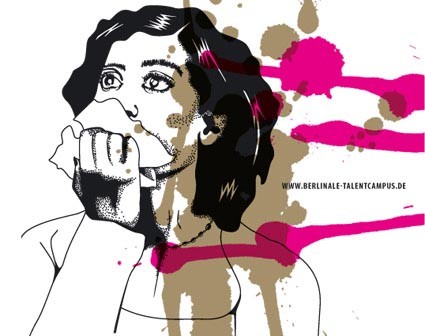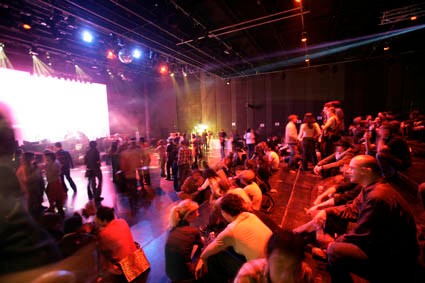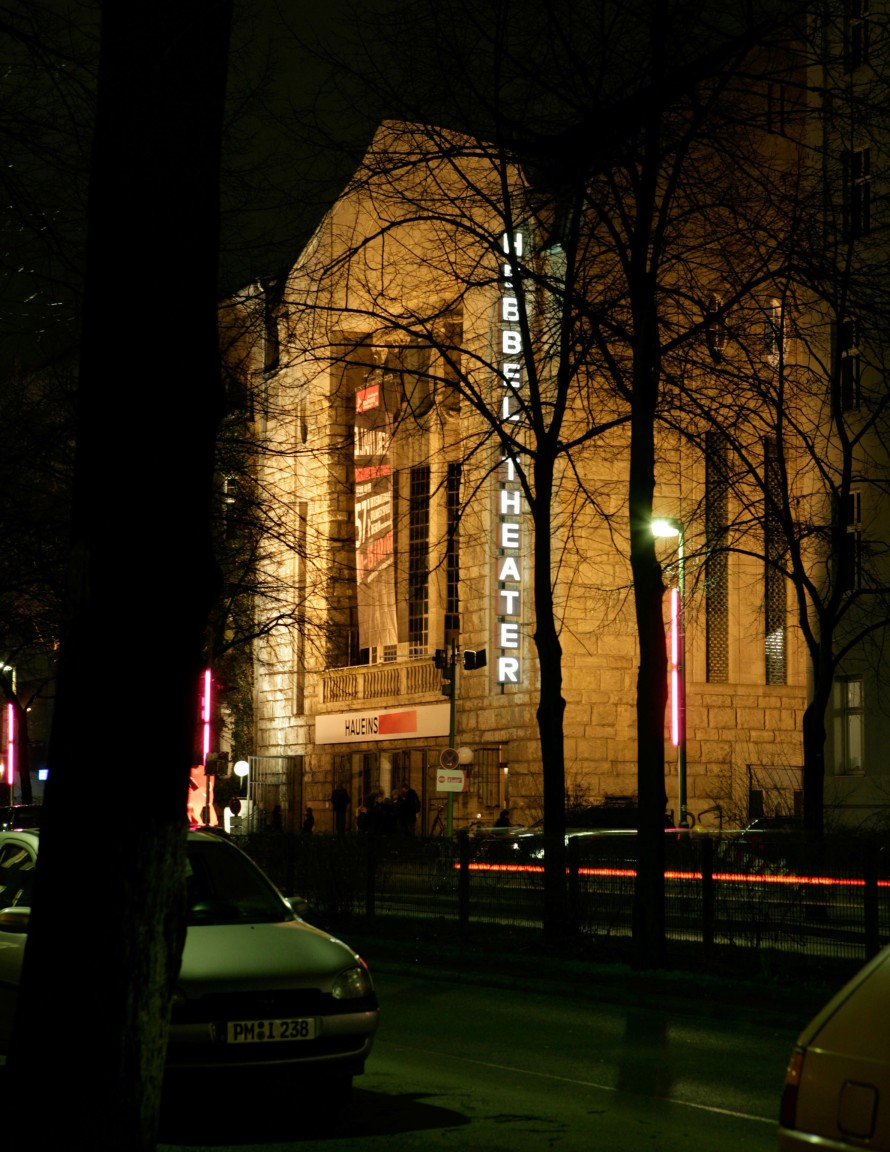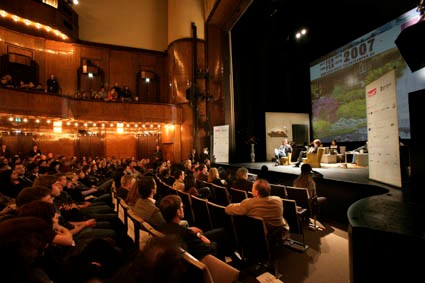2008 | Berlinale Talents
Mapping (Cinematic) Emotions
“The nice thing about our motto ‚Screening Emotions - Cinemas Finest Asset’ is that, on the one hand, no one expects complete coverage of every nuance. But on the other hand, we provide enough opportunities to deal with the topic, to present works and, hopefully, provide material for controversial discussion.” We spoke with Dorothee Wenner about the Talent Campus 2008: the complex role of emotionality in filmmaking, the influence of economic factors and the project of creating sustainable networks.

With the focus of the Talent Campus 2008, “Screening Emotions – Cinema’s Finest Asset”, you touch on the complex topic of emotion and film. Does the Campus aim to provide an in-depth look into the complexity and diversity in the different cinematic processes of creating emotional worlds?
Definitely. The Talent Campus is supposed to deal with new trends and relevant themes in filmmaking. While looking for a motto we make sure that it applied to all phases of filmmaking, from the first idea to post-production. And this condition is definitely satisfied with the theme “Screening Emotions”. Actually, in the process of creating a film the first cinematic idea is extremely important, especially on the level of emotionality. If a young filmmaker intends to dedicate two, three or even five years of his life to an idea, he should take the time and think about whether the appeal and material of the subject are enough to sustain him or her for such a long period of time.
What role does emotionality play in other phases of production?
If you look around at the film markets and fairs of the world, it’s very easy to see that the emotional scope of the material has become a very important factor for their realization and success, in both the feature and documentary segment. In terms of production technique, the creation of emotional worlds is really a craft. Basically, every layman knows that the emotional film experience is extremely influenced by the type and style of filming, the light and the sound. “Craft” doesn’t mean that these tasks are easy to perform. On the contrary, it is also about having the skills and intuition to really be able to produce the desired results. Post-production and promotion are the areas where the repertoire of emotions is played with the most. In film advertising, especially, the emotional qualities of a film pushed. Here it’s easy to observe differences in weighting and emphasis amongst different cultural groups.
Are the various levels of filmmaking you’ve just touched upon also reflected by the make-up of the participants and the structure of the events at the Talent Campus?
We’re inviting people from all areas of filmmaking and from all around the world and for all of these people the theme of “Screening Emotions” is highly relevant. Of course, we try to react to the different configurations of guests, by offering different things at different levels. Based on our experience, the participants are very interested in the diverse perspectives and working styles that come together here. If we, as the Campus, are able to bring people together who have animated exchanges and or want to make films together in the future, then we’ve achieved a lot. In recent years these contacts have resulted in very many projects.

Berlinale Talent Campus 2007, HAU2
Horizontal and vertical possibilities surrounding a complex theme…
We will try to approach the theme of the Talent Campus 2008 horizontally and vertically. We’ll try to highlight as many aspects as possible and identify points of contact amongst the rich diversity of Campus participants. At the same time it’s not our intention to have a comprehensive panel discussion on “emotion in film”. This wouldn’t just be presumptuous, but I think it would also be uninteresting, because it’s such a broad field. The nice thing about our motto is that, on the one hand, no one expects complete coverage of every nuance. But on the other hand, we provide enough opportunities to deal with the topic, to present works and, hopefully, provide material for controversial discussion.
Considering the fact that emotional worlds are also dependent on historical conditions and socio-cultural contexts, there will presumably be plenty of lively exchange about the different “emotional realities” of Campus participants.
Such differences are exactly what we hope to address and discuss. For example, there will be an event with the working title “Love International”, which isn’t just about love, but generally the cultural codification and perception of feelings. The most striking differences are found in comedy. But also in depictions of love, you quickly realise that despite globalization, the codification of the world’s different cultural groups functions very differently. You just have to compare the so-called “Berlin School” and the new emotionality of young couples in German films to cult and love films from Mexico, India or China – the differences become immediately apparent.
Today, individual emotional worlds are, on the one hand, increasingly subject to exploitative strategies and a certain logic of construction. On the other hand, many cinemagoers have an emotional longing for uniqueness, the unseen and incalculable. With the tagline of the 2008 motto, “Cinema’s finest asset”, you apparently want to take an in-depth look at the economic interests of the industry.
We deliberately chose the title to do justice to the not-to-be-underestimated market-driven elements of this theme. The term “asset” is very suitable, because, alongside its economic dimension, it contains many sub-meanings and possibilities for subtlety. For example, one event will deal with biopics. Biopics as a genre have enjoyed a lot of success recently. We want to take a look a several examples and consider together why audiences are so eager to see such “real” stories in the cinema, whether films that are based a real-life events, or those that deal with well-known personalities. With our new colleague Maike Mia Höhne in the Berlinale Shorts section and the Forum expanded, we also want to put on an event addressing the apparent renaissance of the short film and look at what the causes for this might be. Here, it’s also about new forms of presentation and distribution, for example in public spaces or in art galleries, which consequently affect the dramaturgy and creative aspect of films. For us these points belong to the reciprocal effects of emotionality, film production and commercialisation that we want to address.
On a very practical level, we also want to develop a programme for the Doc Station, where we bring interested producers to the Campus to create a unique opportunity for several talents to present their projects to professional representatives of the industry. Besides that, we will offer, as in previous years, special tours through the European Film Market (EFM) for the producers and documentary filmmakers at the Campus. In many different ways, we try to use the physical proximity of the EFM at the festival and to profit from possible synergies.

Theatre Hebbel am Ufer, HAU1
Many chances to examine ones own filmmaking
Emotionality is for me – despite the technologies and strategies you can use in films to create certain feelings – still something abstract and difficult to grasp. Isn’t the conveyance of emotions, to a degree, about a capability of translation that one can’t quite put a finger on?
There are newer developments, especially amongst film academics who have studied this topic comprehensively. Sure, no one can be forced to look at these newer academic approaches to film, which analyse these phenomena in an insightful way. But to come into contact with these ideas in different ways and to acquire some of this knowledge for oneself, surely can’t hurt. We try to talk about these issues in a very user-friendly way at the various panel discussions and un-academic manner. By no means do you have to have the desire or need to be at the cutting edge of film studies. Basically I would be very happy about the two camps of film academia and filmmakers – which sometimes come across as enemies – coming a bit closer together. And perhaps the Campus is a suitable place for that.
In films as well as in the realm of emotion, one can see the fundamental motif of movement. Can this motif, as the movement of change, also be a motivation of the Campus, for example, by inspiring courage to break new aesthetic ground?
We don’t prescribe the talents any particular path. We just want to encourage them to risk something which is their own and in that respect we naturally hope to achieve such movement. Our model is based on the fact that the talents meet interesting and successful filmmakers in case studies, workshops and work in small groups and get inspired by them to take their own personal path. What distinguishes the Campus is the opportunity to get many perspectives on one’s own work, opportunities many of the participants don’t have access to day-to-day. In this way we want to help the talents find their creative counterparts, which is essential for productive creativity. That’s the big idea behind it. What I think is equally worthwhile and really essential is that people get together here, that they can exchange ideas about future projects without being scared. In the film business there are very few moments of real trust, which is not surprising in an industry in which moral categories don’t play seem to play a major role due to the immense competitive pressure. To create such moments of trust is something the Talent Campus has managed to do again and again over recent years, something many different sides have attested to.

Berlinale Talent Campus 2007, HAU1
Sustainable framework – the Campus as a constantly expanding network
How do things look once the festival is over? Do participants have opportunities to take advantage of the Campus beyond the five days of events?
We’re working feverously on making the Campus a permanent structure offering all types of support and concrete work possibilities. In particular in our “hands on” programme – the Doc Station and the Script Station, the Talent Project Market, the VW Score Competition, the Talent Press and the Garage Studio – we try to offer concrete projects access to a strategic network of specialists, whom the talents can turn to after the festival is over. This network concept also finds its expression in the Internet. Together with our colleague Marcus Forchner, we’re developing a type of community software for a business-to-business tool. Ideally our website will function so that over the entire year the talents and our strategic partners can use it to find the right people for projects or to find interesting projects which they would like to be involved in. To have sustainable impact in this direction belongs to our greatest wishes and goals.
Your brand new website doesn’t just function as a practical network for work use. The lectures, films and videos available on the site can also serve as a rich source of knowledge and inspiration.
The community tool is just one aspect of the site, though a very important one. With the re-launch, we also want to make our material more accessible to both the general public and filmmakers. The diverse ‘telelectures’ available there offer the chance to get inspired by experts or to get stimulated about how your own work should continue. This year’s lecture by John Waters, for example, is a pearl, which inspires the desire to just get going and start making your next film. This material isn’t just for our community, it’s available to all film-lovers who have access to the Internet. That applies to nearly all events at the festival that are open to the public. We place a high value on that.
You were apparently very happy with the spaces at HAU. Will the programming be similar to last year’s?
The breakdown will, by and large, be the same as last year. What we liked especially was the different types of space, which made many different event formats possible. In HAU1, it more about the classical model of the proscenium theatre which we will use for lectures-style events. HAU2 and HAU3 are suitable for very different forms of exchange. Depending on the size and type of event – whether a group process, a mentor talking with several talents or a one-to-one situation – one can experiment with seating arrangements and divisions.
For example, in collaboration with the Heinrich Böll Foundation, we are planning to carry out workshops with several groups. Already at the last Campus, together with the foundation we approached a topic, which, in our eyes, is very relevant for today’s and future filmmakers. It was about reform, in the broadest meaning of the word, of funding structures and the growing interest of foundations, human rights organisations and NGOs in their own media representation and campaign work using self-produced films. Through the event with the Heinrich Böll Foundation we hope to encourage this type of exchange between such organisations and the talents.
This year the Campus Abroad took place not only in New Delhi and Buenos Aires but also in Sarajevo. How does exchange with partner initiatives function?
It works really well. And Sarajevo was super. The cooperation was formed rapidly following the last Berlinale. When it comes to actual exchange, all Campus participants have the option to apply for a second time, after taking part in a Campus Abroad, for example, they could come to Berlin, or the other way around. Both make a lot of sense. All in all, we’re very happy that the cooperation and the interlinking between the initiatives works so well and we’re planning to continue to improve the existing infrastructure so that both sides profit from it in the long term.